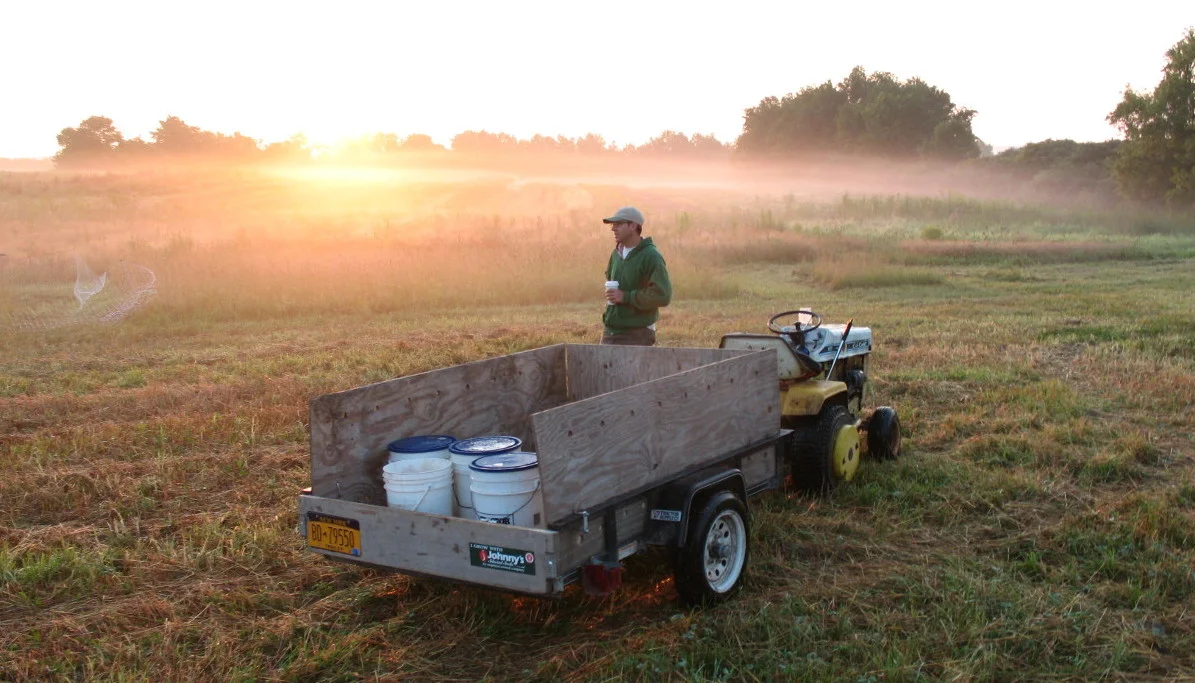Things to Consider when Choosing a CSA
/Happy National CSA Day! We wanted to quick celebrate with our last loving-on-CSA blog this week. (Next we start planting in our greenhouse, so we'll veer off into the exciting world of seed starting!) National CSA Day was started last year by Small Farm Central to promote CSAs across the country on what is one average, the busiest sign-up day for CSAs in the year. Community Supported Agriculture, or CSA, is one of our favorite parts to farming and you can read why we love it so much (and think it's worth trying) in our last two blogs.
Oddly enough, as CSA farmers, we don't actually want everyone to run out and join our CSA. We do think CSA is the best way to get great value local produce while supporting a farm, and that we have a great CSA, but... We encourage potential members to think about what you want or need from a CSA, how a CSA might work (or not) for you, and then see if we seem like a farm that fits your needs. Some things we recommend that you consider:
What's crop variety, selection, and quantity
works best for you?
You definitely will want to explore a potential CSA's share sizes and crop mix, since that's an area where a CSA can either really work for you, or not. You should think about what things you like to eat and how much you like to eat of them, as well as think about what you *want* to be eating but maybe aren't eating now! We mention this second part because we have a lot of members who join us who eat some vegetables, but want the pressure of a box of vegetables coming into their kitchens each week as a challenge to be a bit more adventurous in their menus!
Fortunately, in this age when even us farmers have camera phones, you can usually track down pictures of farms' shares to see the mix of veggies you will likely receive. We spend a ton of time working on our crop mix for the boxes (we actually plan out every item in every box for the season in advance!). Our goal is for there to be a good variety of crops each week (a mix of salad vegetables, cooking greens, root crops, and "fruit crops" (think tomatoes and cucumbers), as well as something unique. We want is to strike the balance between staples and easy to use vegetables with just the right amount of adventurous stuff for a fun, but not overwhelming, week in the kitchen!
In terms of quantity, we really like having two sizes of shares. The smaller one is easier to use for smaller households, if you are new to eating lots of vegetables, or if you want to still attend farmers markets or have your own garden. Some CSAs have even smaller micro shares of 2 to 4 vegetables, which is an even easier way to start adding vegetables to your meals. Also look at the size of bunches--ideally, CSAs have bunch or unit sizes that are enough for a good meal or two, but that won't force you to have six meals of the same crop in a week!
Finally, what sort of selection or choice works best for you? This is an area we wrestle with yearly and really rely on member input for! Some CSAs are free choice, where you choose which items you want, while other CSAs have boxed shares, where the items are pre-packed for you. We do boxed shares for our deliveries, but let you know a day or two in advance what we anticipate having in those boxes. For our on-farm pickup, we are also experimenting with having a few items as a choice some weeks. To add flexibility, each site has a stocked swap-bin, where you can trade out items you don't like in your share with something you do like!
How important is convenience and flexibility to you?
Another set of key things to think about with choosing a CSA is how it fits into your life. Is the pick-up site and time convenient to you? For many members, making it out to the farm is important--how far is that trip? Are there additional commitments with the CSA (some farms require members volunteer a certain number of hours--which can be fun or a challenge in terms of time)? How flexible are shares around your schedule? What happens if your work schedule changes or you go on vacation?
Different CSAs all have ways to address these questions and areas that they might fit better or worse with your lifestyle. For our farm, we strive to find a balance between convenience to our members without stretching ourselves too thin. We have several regional drop-off sites around Syracuse, Liverpool, and Fayetteville as well as one the farm, and try to have a wide range of pick-up hours at those sites. We also let members switch between sites or pickup at one of our farmers markets in Fayetteville or Cazenovia. Finally, when you are on vacation or if you can't get a share, you can easily arrange for a friend or neighbor to pick it up, or can get a double share before or after your vacation.
How do you want your crops to grow?
This is a top issue for many folks interested in joining a CSA (as it is for many farmers growing for CSA)! You should always feel comfortable asking potential CSA farms how they grow their crops and what products they use on their fields. Many CSAs are certified organic, while others farm using organic practices, but are not certified. On our farm, we use only practices and products approved for organic production, but are not certified. We are members of the Northeast Organic Farming Association of NY and take their farmers' pledge (see the details of that here), and we are in the process of becoming Certified Naturally Grown.
So what does all that really mean? Well, first of all, it means that we work to create healthy soil, water, and plant systems that provide the right conditions for vigorous, healthy, and nutritious plants, while not damaging the environment. We strive to practice regenerative agriculture, where each year the fields grow a bit better than the year before. Practices that are part of this system include rotating our crops around the fields, using cover crops to return nutrients to the soil, mulching to protect the soil, terracing fields to reduce erosion, growing hardy crop varieties (of certified organic seed whenever it's available) and doing a lot of scouting and observation to cut off any pest or disease issues before they happen. If we still have a disease or pest problem, we will use preventative products if necessary, but only if those products are OMRI-listed and allowed for certified organic production.
We welcome our members into the fields every week for our U-Pick gardens, so we also hope that you will take the opportunity to look around at how we are growing the vegetables and let us know if you have any questions!
What else are you looking for in your CSA?
CSA is an exciting and delicious way to eat, but it may be quite different from what folks are used to. There can be an element of risk since unfortunately none of us can accurately predict or control the weather, and it can be a change to start seeing these less familiar veggies in your refrigerator! The best ways for CSA farms to mitigate these challenges is through growing experience and good communication skills. You should investigate your potential CSAs and see how they will reach you through the season--an email newsletter, a private facebook group, or a hard copy newsletter at the site? How can you reach them if an emergency comes up? What sort of growing experience do they have and what happens in the event of disaster (hurricane, hailstorm, etc)?
One of the biggest things we continue work on as CSA farmers is how to best reach our members and communicate through the season. Like many CSAs, we have a weekly email newsletter and post as many pictures as we can online (Facebook and Instagram). We are building our online recipe and veggie use blog this winter, and we have open U-Pick for members every Friday and Saturday and hope to entice members up to the farm with cute animals, delicious veggies, and beautiful fields and flowers. On the growing front, we constantly look for ways to reduce weather related crop loss in the fields--this has led us to use more protective plant covers, some high tunnels, and soil mulches, as well as trial new (sturdier) organic varieties each year!
There's tons more questions you might want to ask potential CSAs, and feel free to contact us anytime--we are always happy to answer questions! We hope that you have a great National CSA Day 2016, and thanks so much for your support of local food and farming!






